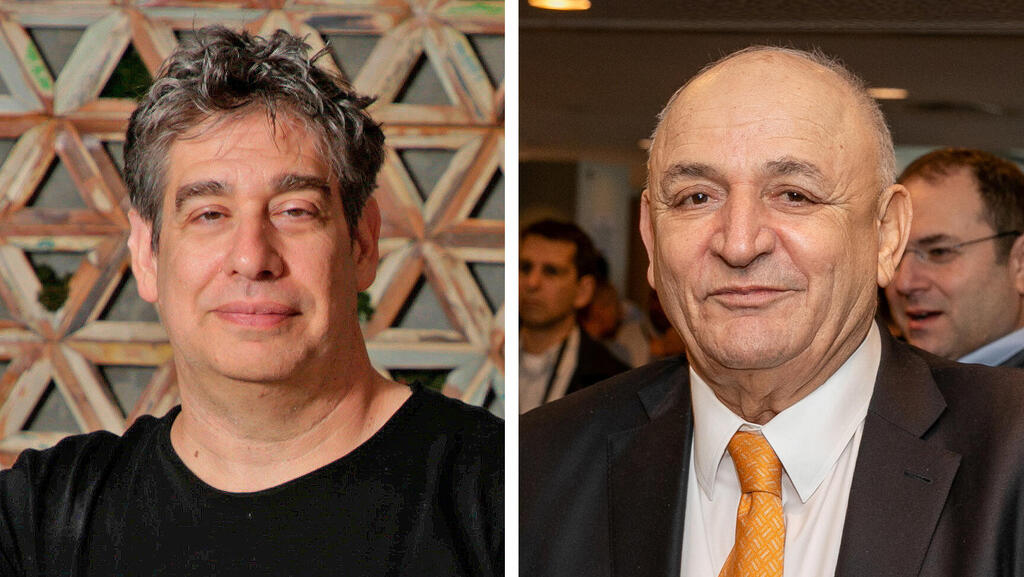
Nir Zuk’s Esh Bank looking for investors, in early talks with Yitzhak Tshuva
The Palo Alto founder’s digital bank is hunting for cash—and may find it in Delek.
Calcalist has learned that preliminary discussions were recently held between businessman Yitzhak Tshuva and the digital bank Esh, founded by Nir Zuk. Esh, which is currently seeking new funding, has begun a fresh capital-raising round and is in talks with various market players. Among others, representatives of the bank approached Tshuva to explore his interest in investing. In discussions with Tshuva—who controls 50% of the Delek Group—a possible future two-way deal was raised: Isracard, the credit card company soon to be acquired by Delek, could invest in Esh as part of the fundraising round. In return, Esh would license its financial technology to Isracard, potentially to be used for loan underwriting and upgrading its tech infrastructure.
At this stage, the talks are preliminary. Moreover, Isracard has not yet officially come under the control of the Delek Group. In February, Isracard shareholders—trading without a controlling interest on the Tel Aviv Stock Exchange—overwhelmingly approved (96.6%) Delek’s proposal to become the controlling shareholder. Under the deal, Delek will invest NIS 1.3 billion in exchange for shares representing approximately 37% of Isracard's equity, which, combined with its existing stake, will bring its total holding to 40%. Additionally, Isracard shareholders will receive a dividend of about NIS 1.3 billion before the transaction closes.
Delek beat out Menora Mivtachim Holdings for control of Isracard and is now awaiting regulatory approval from the Bank of Israel. Only after the central bank grants a control permit—an application first submitted in June 2024—can the deal move forward. The Delek Group, managed by Idan Wallace, began regulatory negotiations even before submitting its formal bid.
Though called a digital bank, Esh has yet to launch operations and currently has no customers. It was founded in 2016 by Nir Zuk, who owns 13.2% and is best known as the founder of Palo Alto Networks—the world’s largest cybersecurity firm by market cap ($123 billion). Other co-founders include Yuval Aloni (17.9%), Alex Liverant (7.7%), and Alon Shine (6.1%). The chairman is former Israel Securities Authority head Shmuel Hauser, and the CEO is Kobi Malkin, previously CEO of Massad Bank and Otsar Ha-Hayal Bank.
Esh is developing a proprietary banking platform both for its own use and for licensing to other financial entities. Despite receiving a full banking license in late 2022, the bank has yet to go live and has no revenue. Development has proven costly: the founders invested $30 million, and Clal Insurance added another $30 million in January 2023, at a post-money valuation of $512 million. Nearly two and a half years later, the platform remains incomplete, and the bank is again seeking capital. Under the terms of its license, Esh must begin full operations by the end of 2025—though delays may be granted due to the war.
The backdrop to Esh's renewed fundraising effort—and Tshuva’s possible involvement—is Delek Group’s aggressive expansion strategy. For nearly two years, Delek has pursued acquisitions aimed at rebuilding a strong financial arm, similar to the days when it controlled insurance giant Phoenix (a stake it later sold due to anti-concentration laws). The Isracard deal is central to this strategy, and Esh could play a future role.
A deal between Esh and Isracard, if it materializes, may also align with the Bank of Israel’s goal of turning credit card companies into full-fledged banks to foster competition. This goal is reflected in a Central Bank and Finance Ministry reform plan published as a draft in October 2024. The plan would allow companies to obtain a “lean” banking license, enabling them to take deposits and reduce financing costs, which in turn could lower credit prices for consumers.
Even without a bank license, Isracard has previously partnered with fintechs such as Biz Finance and Credit 24, which specialize in digital lending to small businesses.
If and when Esh launches, it will become Israel’s second digital bank, following One Zero, backed by Amnon Shashua, which launched in March 2021. One Zero’s financials illustrate the high cost of running a digital bank: it has burned through NIS 888 million in just three years, losing NIS 268 million in 2024 alone. It expects to reach profitability by the end of 2026.
Delek Group responded: “The group is focused on completing the Isracard deal in the coming weeks. We’ve received many inquiries about potential collaborations, but no deal is currently on the agenda.”
Esh commented: “We are in contact with many potential investors. There is no deal on the table at this time.”














